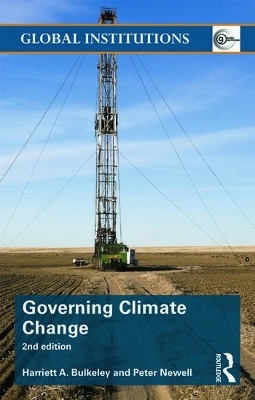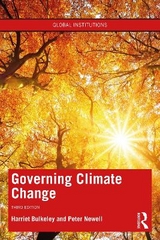
Governing Climate Change
Seiten
2015
|
2nd edition
Routledge (Verlag)
978-1-138-79571-6 (ISBN)
Routledge (Verlag)
978-1-138-79571-6 (ISBN)
- Titel erscheint in neuer Auflage
- Artikel merken
Zu diesem Artikel existiert eine Nachauflage
Governing Climate Change, Second Edition, provides a short and accessible introduction to how climate change is governed by an increasingly diverse range of actors, from civil society and market actors to multilateral development banks, donors, and cities.
This updated edition also includes:
up-to-date coverage of the negotiations post-Copenhagen (Cancun, Durban, and towards Paris) and some of the shifts in the inter-governmental politics;
a deeper discussion of the roles of actors that have come to prominence in the climate negotiations;
an overview of the key funding mechanisms such as the Green Climate Fund, Adaptation Fund, the High-Level Advisory Group on Climate Change Finance, and REDD (Reducing Emissions from Deforestation and forest Degradation);
a direct assessment of what the proliferation of TCCG (Transnational Climate Change Governance) adds up to in terms of legitimacy, effectiveness etc., drawing on all the recent research in this area;
an analysis of renewable energy in the UK (in the light of recent controversies around the siting of wind turbines and fracking projects).
Providing an interdisciplinary perspective drawing on geography, politics, international relations, and development studies, this book is essential reading for students and scholars concerned not only with the climate governance but with the future of the environment in general.
This updated edition also includes:
up-to-date coverage of the negotiations post-Copenhagen (Cancun, Durban, and towards Paris) and some of the shifts in the inter-governmental politics;
a deeper discussion of the roles of actors that have come to prominence in the climate negotiations;
an overview of the key funding mechanisms such as the Green Climate Fund, Adaptation Fund, the High-Level Advisory Group on Climate Change Finance, and REDD (Reducing Emissions from Deforestation and forest Degradation);
a direct assessment of what the proliferation of TCCG (Transnational Climate Change Governance) adds up to in terms of legitimacy, effectiveness etc., drawing on all the recent research in this area;
an analysis of renewable energy in the UK (in the light of recent controversies around the siting of wind turbines and fracking projects).
Providing an interdisciplinary perspective drawing on geography, politics, international relations, and development studies, this book is essential reading for students and scholars concerned not only with the climate governance but with the future of the environment in general.
Harriet Bulkeley is a Professor in the Department of Geography at Durham University. Her research interests are in the nature and politics of environmental governance with a focus on climate change and urban sustainability. Peter Newell is Professor of International Relations in the Centre for Global Political Economy at the University of Sussex. He works on the political economy of energy and climate change.
Introduction 1 Governing climate change: a brief history 2 Governance for whom? Equity, justice, and the politics of sustainable development 3 Between global and local: governing climate change transnationally 4 Community and the governing of climate change 5 The private governance of climate change 6 Conclusions
| Reihe/Serie | Global Institutions |
|---|---|
| Zusatzinfo | 3 Line drawings, black and white; 3 Illustrations, black and white |
| Verlagsort | London |
| Sprache | englisch |
| Maße | 138 x 216 mm |
| Gewicht | 226 g |
| Themenwelt | Naturwissenschaften ► Biologie ► Ökologie / Naturschutz |
| Sozialwissenschaften ► Politik / Verwaltung | |
| Technik ► Umwelttechnik / Biotechnologie | |
| ISBN-10 | 1-138-79571-2 / 1138795712 |
| ISBN-13 | 978-1-138-79571-6 / 9781138795716 |
| Zustand | Neuware |
| Haben Sie eine Frage zum Produkt? |
Mehr entdecken
aus dem Bereich
aus dem Bereich



